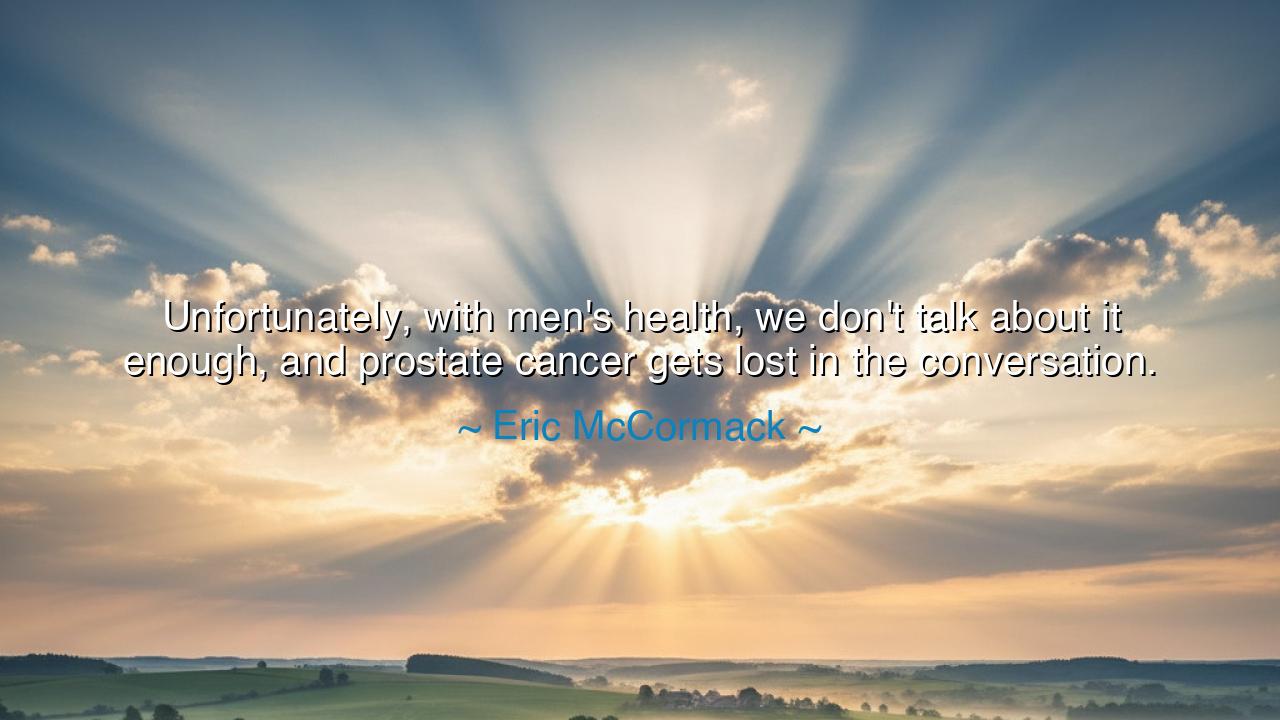
Unfortunately, with men's health, we don't talk about it enough
Unfortunately, with men's health, we don't talk about it enough, and prostate cancer gets lost in the conversation.






In the still chambers of silence where pride and fear intertwine, Eric McCormack spoke a truth both sorrowful and urgent: “Unfortunately, with men’s health, we don’t talk about it enough, and prostate cancer gets lost in the conversation.” His words pierce through the fog of modern neglect and echo an ancient lament — that too often, men suffer not because there is no cure, but because they remain silent. For in the hearts of many, the illusion of strength has become a prison. The old creed that to be a man is to be unbreakable has cost more lives than the sword or the spear.
In the time of the ancients, the warrior who hid his wound was praised as stoic. Yet wisdom teaches that the wound unspoken festers, and the illness unacknowledged consumes from within. What McCormack laments is not only the tragedy of prostate cancer, but the greater ailment of silence — the disease of pride that prevents the confession of pain. How many fathers, brothers, and sons have fallen because they feared to appear vulnerable? How many families have mourned men who might have been saved, had they only spoken before the darkness grew too deep?
Consider the tale of King Hezekiah of Judah, who, when struck with illness, did not hide his weakness, but turned his face to the wall and wept before the Lord. His tears became his healing; his honesty, his salvation. In revealing his pain, he was granted more years of life. This story, preserved through centuries, teaches that courage is not found in silence but in acknowledgment. It is not weakness to admit fear or seek help; it is the strength of truth, the bravery of the soul that refuses to be undone by secrecy.
McCormack’s words come from his role not as an actor alone, but as a man who has seen suffering hidden behind smiles. He has lent his voice to those who have none — to men who battle cancer but hide behind false stoicism. His message is clear: health is not a private burden but a shared responsibility. When we speak openly of men’s health, we break the ancient curse of shame. We teach that masculinity is not diminished by vulnerability; it is perfected by honesty and care.
Throughout history, societies have built monuments to strength — temples, armies, and ideals of the invincible man. Yet the truest monument is the one unseen: the quiet decision of a man to care for his body, to seek the wisdom of the physician, to safeguard his life for those he loves. Just as the Greeks honored balance — the harmony of body and mind — so too must we rediscover that wholeness is found not in denial, but in harmony with one’s mortal nature. The conversation McCormack calls for is not mere talk; it is a restoration of ancient understanding — that health, like virtue, thrives in the light of openness.
The lesson is profound and timeless: speak of your pain, for silence is the ally of disease. Let no man believe that strength is measured by endurance alone. It is wisdom, not pride, that preserves the warrior for many battles. Those who dare to speak of illness, to seek healing, to share their story — they are the heroes of the new age. Their courage saves not only themselves but the generations who follow, learning that to speak is to live.
And so, dear listener, let this be your teaching: if you are a man, guard your health as a sacred trust. If you are a friend, a brother, or a son, speak when silence tempts you. Ask, listen, and care. Encourage others to do the same. Visit the healer before the shadow deepens; make of your voice a beacon for others. For as Eric McCormack reminds us, when we begin to talk — truly talk — about men’s health, we do more than fight disease. We heal the soul of manhood itself, transforming silence into strength, and fear into life renewed.






AAdministratorAdministrator
Welcome, honored guests. Please leave a comment, we will respond soon